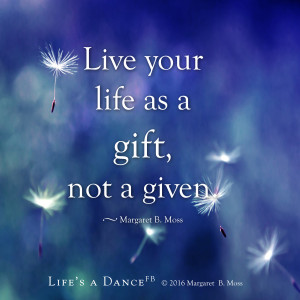
Gratitude—we all know (or think we know) what it is. I learned more about gratitude in the past several years than in the previous 50. I know that depression is a complete absence of gratitude. When you’re depressed, you can’t find any reason to be grateful for anything. (And here I am talking about clinical depression — the kind that drains life of meaning, week-after-week of feeling that taking a shower is too much trouble.)
I was in my 50s and felt that I’d lost everything, when I started learning to make an active practice of gratitude. Every social construct I’d ever known reminded me that I had lost everything. And because my losses were so far-reaching, it must have been my fault.
I lost my job. My marriage came to an abrupt end with a violent drunken episode. I was forced to sell my house and put the lion’s share of my belongings, furniture, and everything that created my “home,” into storage. My daughter, now living in California, estranged herself from me. (It felt like a death.) My middle child, my son, left for California with uncertain plans.
I was lost at sea. Everything that had anchored me was gone. I was afraid. I thought I didn’t know how to recreate my life.
Over the course of the following year, I realized that gratitude would not descend from the sky like magic pixie dust. It had to come from inside me. And I began to follow the adage that I should smile, and eventually I’ll figure out a reason for it.
The child in me has always longed for the magic pixie dust that will fix everything and make it better; I don’t think I’m alone in that. But the full realization that it really is all up to me — that it really all does come from inside of me, no longer just mouthing the words, but really getting it — far from being frightening, has been empowering.
It took all that time for me to really “get it” that life would never be delivered as a plug-and-play with a complete user’s manual. Life is not “a given.” Jobs, people, our homes; they can leave us at any time. And, none of us, as a friend of mine liked to say, “is getting out of here alive.”
It sounds so simple as to be trite: focus on the blessings in my life. And it’s easy to mouth the words. “Look at the glass as half-full instead of half-empty.” Yes, that’s a good perspective, but I think I’d rather just take the glass and fill it back up to the brim. Sometimes it will overflow and make a mess. It’s okay.
Life is a gift; a complex gift to be sure; it is a Rubik’s Cube where the colors are constantly changing. The secret is to realize that, unlike a Rubik’s Cube, there is no “solving” it. The secret is to align the colors in such a way that they make sense to oneself; in such a way that brings pleasure; perhaps like a painting that not everyone will understand. But some will see this masterpiece that is your life, and feel as if you created it just for them. That’s art, life, and the gift.
© 2016 Margaret B. Moss
When everything goes “wrong” and our lives change in such a way we never thought, we should try to see from a third perspective why things happened in that way. It is not easy to be in rolling from one change to the next in a small amount of time but we should be grateful that something worse didn’t happen or even be grateful that actually those changes happened in our lives. The last years were like a roller coaster for me but I came to realize that everything happened for a reason so as to be here today and help people. Thank you so much for this insightful article!
Zaria
Dear Zaria, thanks so much for your comments. And I apologize that I did not see your comment until more than a month later! But I plan to be tending my website daily from now on. xo Margaret